|
|
Good morning and happy April (and a happy belated Easter to those who celebrate it)! I missed the opportunity for a Sunday Salon post yesterday because it was actually sunny and we decided to start going walking again. This has made me very happy; after the majority of March was completely gloomy, the weather is finally going in the right direction. And it’s very nice to be outside and able to enjoy some of the British countryside again.
In March I read 14 books, a number that actually astonished me. Reading for 50 minutes to an hour extra on the train every day makes a huge difference, but I’ve also noticed that I pick shorter or kindle books to read as they’re easier to carry. In any case, I’m very pleased, not least because my TBR number has gone down for the first time in months, but I’m also wondering when I’m ever going to review all of these books!
Fiction
- The Painted Bridge, Wendy Wallace
- Fair Game, Patricia Briggs
- The Ultimate Hitchhiker’s Guide to the Galaxy, Douglas Adams (regular readers will recall that I started this in January – so not entirely read in March)
- Strong Poison, Dorothy L. Sayers
- The Second Empress, Michelle Moran
- Chasing Magic, Stacia Kane
- Sins of a Ruthless Rogue, Anna Randol
- Z: A Novel of Zelda Fitzgerald, Therese Anne Fowler
- Cold Days, Jim Butcher
- The Devil’s Heart, Cathy Maxwell
- The Snow Child, Eowyn Ivey
- Four Sisters, All Queens, Sherry Jones
- The Family Trade, Charles Stross
- By a Thread, Jennifer Estep
Sadly, no non-fiction this month, although I am actually reading Catherine the Great by Robert K. Massie right now.
Favorite of the Month
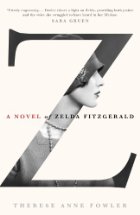
Easy for once! Z: A Novel of Zelda Fitzgerald was completely captivating and sticks out to me as one that I’ll remember for a while.
How was your reading month?
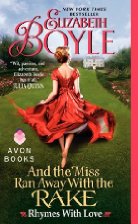 The Dale and the Seldon families are enemies, and no members of either family want anything to do with each other. Miss Daphne Dale, slightly on the shelf, unfortunately is required to attend her friend Tabitha’s wedding to a dread Seldon. Why? Because she’s fallen in love with a pen pal after she answered an ad in the papers, and the wedding is the one place that they can meet. Little does she know that her suitor is Henry Seldon, one of the family’s eligible bachelors, who opened her letter and fell for her entirely by accident, and thus one of her sworn enemies. How long can Daphne and Henry try to avoid facing the reality that they’ve fallen in love with each other despite family differences? The Dale and the Seldon families are enemies, and no members of either family want anything to do with each other. Miss Daphne Dale, slightly on the shelf, unfortunately is required to attend her friend Tabitha’s wedding to a dread Seldon. Why? Because she’s fallen in love with a pen pal after she answered an ad in the papers, and the wedding is the one place that they can meet. Little does she know that her suitor is Henry Seldon, one of the family’s eligible bachelors, who opened her letter and fell for her entirely by accident, and thus one of her sworn enemies. How long can Daphne and Henry try to avoid facing the reality that they’ve fallen in love with each other despite family differences?
Elizabeth Boyle is another new-to-me romance author, albeit one I’ve heard a bit about in the past. I will be honest and confess that when I chose to read this book, it was mainly because of the really cute cover and the title; lots of romance novels are about misses and rakes but I wanted to find out how this one actively ran away. (You can imagine my disappointment when she didn’t actually run away with him).
I thought huge portions of this book were very cute, and I loved the fact that the author inserted excerpts from the couple’s love letters to each other throughout the narrative. That was an incredibly sweet touch and it gave us some insight into how they’d first fallen in love, before they realized that they were falling for the enemy. I adored their first meeting in particular, before they knew who the other was; they are both absolutely certain that they’re found The One until their family and friends tell them the truth.
The only note that I’d make as a downside was the fact that, even though the reader and both of them actually knew who the other was, it takes these two absolutely ages to actually admit it. They both kind of hope that their mysterious lover is still someone else, which gets frustrating after a while, until it becomes absolutely ridiculously obvious. I would have almost preferred that the author let them reconcile sooner and then throw some other obstacle in the way of their happiness. With a family feud, it certainly would have been possible, and it wouldn’t have been so easy to get frustrated with these characters about denying reality for most of the book.
While I wouldn’t yet put Elizabeth Boyle on my list of immediate romance authors to buy, I’ll certainly be keeping my eyes open for more of her books in the future. And the Miss Ran Away With the Rake is a lovely little romance read, just be aware that it’s not completely flawless.
All external book links are affiliate links. I received this book for free for review.
 I wish I could share some adventures with you this week, Saloners, but sadly the weather here is still firmly stuck in winter and we haven’t much felt like going anywhere. Well, that’s not true; I’d happily travel somewhere, but having started a new job, opportunities for longer holidays are few and far between for a couple of months. The spring cleaning fever has hit us without the spring, though; we spent Monday night on a trip to Ikea and now our house is full of boxes and things pulled out of their places to be reorganized. No bookshelves this time, although like most book lovers I am perpetually running out of space for the many books that seem to find their way into my home. Nope, this time we are reorganizing the bedroom, but in the middle of building a bunch of furniture, my husband overdid it and now we’ve got boxes lying around for a week or so while he recovers. I wish I could share some adventures with you this week, Saloners, but sadly the weather here is still firmly stuck in winter and we haven’t much felt like going anywhere. Well, that’s not true; I’d happily travel somewhere, but having started a new job, opportunities for longer holidays are few and far between for a couple of months. The spring cleaning fever has hit us without the spring, though; we spent Monday night on a trip to Ikea and now our house is full of boxes and things pulled out of their places to be reorganized. No bookshelves this time, although like most book lovers I am perpetually running out of space for the many books that seem to find their way into my home. Nope, this time we are reorganizing the bedroom, but in the middle of building a bunch of furniture, my husband overdid it and now we’ve got boxes lying around for a week or so while he recovers.
I did have something unusual happen to me this week, though; on the train on Thursday morning, I spotted an unoccupied seat and without thinking, sat down. Next to me was a Japanese man who proceeded to chat to me about the weather in York, the daffodils which sadly haven’t come up yet (remember last year?) and then asked if I liked roses. He proceeded to whip out a piece of colored paper and created this:

I was so impressed! The rose now lives on my desk at work, a nice little reminder that complete strangers can surprise you with their generosity and friendliness.
In bookish news, I finished two completely different books: The Snow Child by Eowyn Ivey, which I loved up until the ending, and The Devil’s Heart by Cathy Maxwell, the last of the Chattan curse trilogy, which was okay. I’m now in the middle of Four Sisters, All Queens by Sherry Jones, which is dragging considerably in the second half of the middle after an engaging beginning. I hope it picks up by the end.
And now I’m off to go practice driving and recycle some of the boxes that are littering my house. I hope you all have lovely weeks and that spring arrives very soon!
 Olivia and Clayton are young lovers, completely wrapped up in each other, until Clayton discovers that Olivia’s father is embezzling money from the government through his paper mill. Olivia refuses to believe that her father could ever do such a thing, and so asks him about it, sure that there is a perfectly innocent explanation. Instead, her lover is thrown into prison, and her father tells her that he’s been hanged. Olivia and Clayton are young lovers, completely wrapped up in each other, until Clayton discovers that Olivia’s father is embezzling money from the government through his paper mill. Olivia refuses to believe that her father could ever do such a thing, and so asks him about it, sure that there is a perfectly innocent explanation. Instead, her lover is thrown into prison, and her father tells her that he’s been hanged.
Ten years later, Clayton walks back into Olivia’s life intent on destroying the mill which ruined his life, only to get her hauled off to Russia by accident. Convinced that she’s a spy, since that’s what Clayton’s been doing since he vanished, a group of Russian gangsters kidnap Olivia and attempt to coerce her into breaking a code for them. Clayton follows to rescue her, but doesn’t expect to fall for her charms a second time …
This was a fun read. I was mainly drawn to it because it takes place in Russia, which seemed like it would be a refreshing change from the usual Regency-style romances set in England. I’ve read and loved plenty of those but I’m definitely open to more locations and different storylines. Mostly, the setting didn’t impact hugely on the book. It’s colder and the bad guys are after the tsar instead of a king or a prince, but otherwise, the romance followed along reasonably traditional lines.
Not that I minded, because the romance itself was done well. I liked that Randol flashed back to their youth but backed it up with romance that was solidly in the present, too. Their quest to stop the assassination plot brings them together while their fragile trust is replenished. It also gives them numerous opportunities to prove themselves to one another, as events around them make life challenging. This is a really good background for a romance read, as it makes the book about a lot more than just how this particular couple can fall in love.
I’m actually quite sorry that I missed the first book in this series before reading this one, too. While I didn’t need the background of Clayton and his two fellow spies to understand what was going on, or to appreciate their relationship, I’m definitely one of those people who prefers to read a series in order, and now I think I’d probably have liked the first book.
A sweet romance with a decent spy plot that adds an extra element to the book, Sins of a Ruthless Rogue is a good romance read and I’d certainly recommend it to other romance readers.
All external book links are affiliate links. I received this book for free for review.
 Zelda Sayre is a vivid eighteen-year-old from Montgomery, Alabama, always the life of the party, when she meets F. Scott Fitzgerald. The youngest in her family, Zelda loves being the center of attention, and Scott is happy to put her at the focal point of his universe – for a time. As an aspiring author, but simultaneously a man who enjoys having fun, Scott is torn between numerous passions in a way that isn’t clear to Zelda when they meet. When they marry, they’re both certain that their lives are going to be full of success and love, with no perception of just what might happen when two vivid personalities clash. Zelda Sayre is a vivid eighteen-year-old from Montgomery, Alabama, always the life of the party, when she meets F. Scott Fitzgerald. The youngest in her family, Zelda loves being the center of attention, and Scott is happy to put her at the focal point of his universe – for a time. As an aspiring author, but simultaneously a man who enjoys having fun, Scott is torn between numerous passions in a way that isn’t clear to Zelda when they meet. When they marry, they’re both certain that their lives are going to be full of success and love, with no perception of just what might happen when two vivid personalities clash.
I knew very little about Zelda Fitzgerald before I started reading this book. I had heard before that she had held back Scott’s career and that she’d been in a mental institution; I’d also read somewhere that she and Scott loved each other despite the difficulties. This book gave me a lot of insight, I felt, into the kind of woman Zelda might have been, and went a long way towards explaining how two people can love each other an absurd amount and yet hate each other at the exact same time.
The novel starts with Zelda as a young, impressionable teenager who meets Scott and completely falls for him, a Northerner with ambitions completely different from any that the boys she knows have. They quickly marry and the book spans the rest of their lives up until Scott’s death, so we get an insight as to how Zelda may have felt about all of his achievements, including his lack of them at times.
What I also really appreciated was that the novel gets across how Zelda might have felt as the wife of a man who was famous. She suffers hugely from a lack of her own identity, which made perfect sense to me; how would an ambitious, talented girl feel when she’s constantly shuffled to the side? I can’t imagine now, for myself, living in a time where my only duty was to keep house for my husband, simply because I’m not the sort of person who would be happy pouring all of my effort into someone else’s life without any real recognition of my own. This is especially true for Zelda, who watches as her husband spends the hours he’s meant to be working with a bottle in his hand, and who feels that she’s lost her own identity to support his. Her struggles were so clearly understandable to me and I could feel their mutual frustration pouring out of the pages. What’s heartbreaking about this book is that it’s also obvious that they do love each other, but it’s a destructive kind of love that is powerful but takes something huge out of both of them.
I also hadn’t realized that Zelda was a creative force in her own right, painting, writing, and dancing in a way that might have brought her recognition on her own. Perhaps not if she’d never met Scott, but once she has a foothold in the creative world, she keeps on going. She had her own art exhibitions and she was invited to dance professionally; she even had her own published novel and short stories. I had never had any idea, and now I’m actually very curious to read the fictional accounts, on both sides, of their marriage.
A wonderful book that brought a historical figure to life for me, Z is a spellbinding read. Highly recommended.
All external book links are affiliate links. I received this book for free for review.
 This week felt like it crawled by. I started my new job a couple of weeks ago, and while I think it’s going to be miles better than my old job for a variety of reasons, the newness of it wipes me out. The actual type of work isn’t new, but learning a new process and meeting new people and getting used to everything is flat out exhausting. Not to mention the fact that I now have a real commute, which I never had before. In my first job, I could walk to work, and in my last job, a friend nearby who worked at the same company took me in. Now, I walk to the train station, take the train, and walk to work, which means I actually leave home almost an hour earlier than I used to. I do realize that this simply means I was absurdly lucky for three years and it’ll be fine once I’m used to it, but two weeks isn’t long enough to get used to it. This week felt like it crawled by. I started my new job a couple of weeks ago, and while I think it’s going to be miles better than my old job for a variety of reasons, the newness of it wipes me out. The actual type of work isn’t new, but learning a new process and meeting new people and getting used to everything is flat out exhausting. Not to mention the fact that I now have a real commute, which I never had before. In my first job, I could walk to work, and in my last job, a friend nearby who worked at the same company took me in. Now, I walk to the train station, take the train, and walk to work, which means I actually leave home almost an hour earlier than I used to. I do realize that this simply means I was absurdly lucky for three years and it’ll be fine once I’m used to it, but two weeks isn’t long enough to get used to it.
There is one huge perk to this travelling, though, and it’s the fact that I’m reading far more. I’ve finished 8 books so far this month, double what I’d read in January or February so far, which feels fantastic. My TBR number is going down! I have more reviews to write in order to catch up, but it’s really nice to have 50 minutes every day that are set aside just to read.
The other perk? I now work in the middle of a city, which means I have access to more or less anything I like at lunchtime. This does lead to impulse purchases, like these adorable shoes:

I’ve also recently discovered that there is an American candy shop both in my new work city and where I live, which means there will be lots more of this in my life:

That makes me happy, too. I love root beer and it’s been really hard to find in the UK, at least the American style root beer that I like, but no longer.
So, this week might have been long, and I might be a little overwhelmed by the new job, but it’s not all bad by any means!
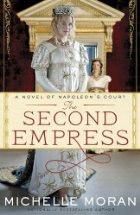 If Princess Maria Lucia of Austria doesn’t marry Napoleon Bonaparte, he’ll topple her father from his throne and ruin her family’s future. It’s not even a choice, in her mind, and so she leaves everything she loves behind to become the next Empress of France, in a journey startlingly reminiscent of Marie Antoinette, the beheaded Austrian queen of France. In Napoleon’s court, she meets his sister, Pauline, whose mood swings and affairs are legendary, and her chamberlain Paul, a Haitian who longs to return to his native land but can’t stop loving Pauline. Together they endure one of France’s most turbulent periods. If Princess Maria Lucia of Austria doesn’t marry Napoleon Bonaparte, he’ll topple her father from his throne and ruin her family’s future. It’s not even a choice, in her mind, and so she leaves everything she loves behind to become the next Empress of France, in a journey startlingly reminiscent of Marie Antoinette, the beheaded Austrian queen of France. In Napoleon’s court, she meets his sister, Pauline, whose mood swings and affairs are legendary, and her chamberlain Paul, a Haitian who longs to return to his native land but can’t stop loving Pauline. Together they endure one of France’s most turbulent periods.
Michelle Moran has penned some of my favorite historical novels and I love the way she gives a focus to women in history who haven’t really been spotlighted in her last three. Marie-Louise has always existed in the shadow of Napoleon’s great love story with Josephine, his first wife and empress, and it’s lovely that Moran chose to give her a focus with this book. Napoleon’s sister Pauline is better known, but still not usually in the limelight, and Paul is a completely different focus altogether.
Unfortunately, while this premise was good, I actually preferred Marie-Louise to both Paul and Pauline. I felt much more for her as she left her home and her actual lover to marry this man that extorted money from her country and threatened her father. I should have felt more for both Paul and Pauline, but the former didn’t really appeal to me and the latter just seemed out of touch with reality. I kept hoping to get back to Marie-Louise’s story and I rushed through the other chapters so that I could spend more time with her. I can understand how Pauline in particular might appeal to another reader because she really is a character, and I know a lot of the elements here were taken from fact, but I couldn’t really feel for her at all.
Another reason I didn’t really love this one as much as some of Moran’s other books was because I found out that Marie-Louise only met Adam, the lover she leaves in the book when she has to go marry Napoleon, much later on when she’s already a married woman. I felt disappointed by this; it’s such a huge part of the plot in the beginning, when we discover Marie-Louise isn’t an innocent and that everyone knows she loves someone else, that I felt let down to discover it wasn’t really close to the truth. I would have preferred a narrative constructed more around the historical reality, and I think her departure already had the potential to be quite emotional. It isn’t a minor detail, either, like moving a date around, and it just made me feel that the way the historical gaps had been filled in wasn’t believable any more. It was a real shame and I will confess that it left me disappointed. Am I being unfair here? Maybe a little – but I always prefer the gaps in the historical record to be filled in, and an emotional reality imagined, and discovering that the emotional reality simply couldn’t have happened does have an impact on my feelings about the book.
While I still enjoyed actually reading The Second Empress, I’m afraid that I’d recommend one of Moran’s other books first, and to accept that this read might land much more on the fiction side of historical fiction.
All external book links are affiliate links. I received this book for free for review.
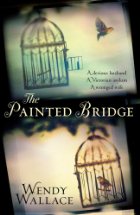 After less than a year of marriage, Anna’s rigid clerical husband decides that she isn’t a suitable wife for him, and has her committed to a mental institution. She’s perfectly sane, but that doesn’t matter to anyone – not to the fake doctors whose signatures let him commit her to the hospital, not to the employees, not to the real doctors in the hospital, and certainly not to her husband. Anna is determined to escape, but she has no idea how, until she meets Lucas St. Clair. St. Clair is a young doctor who is attempting to use photography to discern the true nature of patients’ souls. Will his pictures show Anna as the innocent she is or the madwoman everyone believes? After less than a year of marriage, Anna’s rigid clerical husband decides that she isn’t a suitable wife for him, and has her committed to a mental institution. She’s perfectly sane, but that doesn’t matter to anyone – not to the fake doctors whose signatures let him commit her to the hospital, not to the employees, not to the real doctors in the hospital, and certainly not to her husband. Anna is determined to escape, but she has no idea how, until she meets Lucas St. Clair. St. Clair is a young doctor who is attempting to use photography to discern the true nature of patients’ souls. Will his pictures show Anna as the innocent she is or the madwoman everyone believes?
I have to start off this review by saying I didn’t really manage to connect with this book. There were plenty of interesting elements, but they never combined for me into something that I genuinely liked much. It sounds like such an interesting premise; although we know that pictures aren’t really the key to the soul, when photography was a new art, people weren’t really sure what its purpose was. The idea that a doctor would try and use it to diagnose mental patients sounded very interesting to me. Moreover, the idea of an innocent woman condemned to one of these mental hospitals held a certain amount of appeal, even though I already knew that Anna’s life was going to be terrible once she was committed.
The main problem, unfortunately, was that I didn’t really connect with Anna at all. The reason that she’s deemed unsuitable by her husband is because she went to the seaside on her own to try and give aid to some shipwrecked sailors. To be perfectly honest, this does seem like a strange thing for a young woman in Victorian England to do without telling her husband. She even sells some of his things to get money for the sailors and proceeds to stay in an inn on her own without any supervision. Her behavior by no means justified the punishment, but she seemed foolish and naive, which made it hard for me to like her. I often say that I don’t really need to like a character to enjoy a book, but a lot of this story hinges on feeling sympathy for Anna, and it’s not really a complex character study that might justify her strange behavior. There is a reason for it, but not until the end of the book, and not quite earth-shattering even then.
While I didn’t fall in love with it overall, there were certain elements that I did like. One was the different ways that the women were constrained – maybe not appropriate to say I liked it, but it showed the limitations of a woman’s role once a man was in control at the time. The asylum is run by a man with a wife and teenage daughter, and both the wife and daughter are constrained because of what the men in their lives do. The other “patients” are obviously prisoners and generally with little wrong with them. Even the female employees in the institution have no control over their lives, and the one who does seize control comes to an unfortunate end. Anna’s own imprisonment is just one way that a Victorian woman could be trapped by the men around her.
With some interesting ideas, The Painted Bridge could have been an excellent book. For a different reader, it could be an exceptional read. Unfortunately, it wasn’t for this one.
All external book links are affiliate links. I received this book for free for review.
 I think the weather obeyed my last week’s post at least a little bit, because we did have a few sunny days this week. Unfortunately, I’ve now proceeded to get a milder version of my husband’s flu, right in time to start my new job tomorrow. It’s going to be an excellent week, I tell you – so I’ve decided to go on a week-long break just to make sure I’m recovering. If I’m well and energetic enough to come back before next week, I will do so. I think the weather obeyed my last week’s post at least a little bit, because we did have a few sunny days this week. Unfortunately, I’ve now proceeded to get a milder version of my husband’s flu, right in time to start my new job tomorrow. It’s going to be an excellent week, I tell you – so I’ve decided to go on a week-long break just to make sure I’m recovering. If I’m well and energetic enough to come back before next week, I will do so.
In the meantime, though, let’s see what I read in February.
Fiction
- And the Miss Ran Away with the Rake, Elizabeth Boyle
- The Scandalous, Dissolute, No-Good Mr. Wright, Tessa Dare
- Captain Vorpatril’s Alliance, Lois McMaster Bujold
- The Water Witch, Juliet Dark
- The Map of Lost Memories, Kim Fay
- Blood’s Pride, Evie Manieri
- Nightshifted, Cassie Alexander
- State of Wonder, Ann Patchett
Non-fiction
- Guns, Germs, and Steel, Jared Diamond
- The Curious History of Love, Jean-Claude Kaufmann
That’s 10 books read; not too bad for the shortest month of the year! I’m aiming for 150 books this year, and according to Goodreads I’m only one book behind schedule.
That reminds me – I am not sure I said here, but after 6 years of loyal LibraryThing-only usage I’ve actually started using Goodreads, too, for 2013. The main reason is, honestly, because they have an iPhone app, and I like the way I can update how far I am in a book at any given time and reliably track how long something takes me to read. I can do it in LibraryThing too, but Goodreads is easier.
Also, as a last note, there is one book on that list above which I’m definitely not going to review, and that book is The Curious History of Love. I am not really sure what to say about it because I found it a really bizarre book that was very incoherent and, as a result, I’m not sure any review I could give it would be coherent. Mainly, I’d recommend not reading it at all.
Favorite of the Month
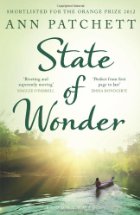
I haven’t managed to review this book yet, but I loved it. I’ve actually loved all that I’ve read of Ann Patchett so far, and I’m looking forward to reviewing this one. Quite a few of the other books I read this month were really good, too, but this one was a gem.
How was your reading month?
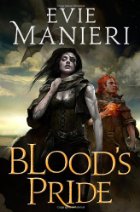 The story of the Norlanders and the Shadari is that of conquest. Two decades ago, the Norlanders laid waste to the Shadari homelands, killing their strongest people and enslaving the rest. Nearby, the desert people, the Nomas, watched in silence, despite Shadari calls for aid. Now, Lord Eonar rules over the Norlanders still far from home, while his three grown children squabble amongst themselves for power. But the Shadari aren’t as subdued as they might seem, and it will soon be time for all three of Eonar’s children to grow up and face the people that they have lived with for their entire lives. The story of the Norlanders and the Shadari is that of conquest. Two decades ago, the Norlanders laid waste to the Shadari homelands, killing their strongest people and enslaving the rest. Nearby, the desert people, the Nomas, watched in silence, despite Shadari calls for aid. Now, Lord Eonar rules over the Norlanders still far from home, while his three grown children squabble amongst themselves for power. But the Shadari aren’t as subdued as they might seem, and it will soon be time for all three of Eonar’s children to grow up and face the people that they have lived with for their entire lives.
This book hit me at just the right time, when I was completely ready to read an immersive fantasy novel, and though I didn’t fall in love with it, I really liked it. All of the components fell together neatly and I really liked what the author did with the story.
The Norlanders, who reminded me of fantasy-Vikings with their often pale coloring and actual cold skin and blood, are very typical conquerers, reigning over a much larger popular of darker skinned “natives”, the Shadari, who have a king and culture of their own. The Shadari can hardly bear to touch Norlanders, and the language that Norlanders speak is actually impossible for Shadari to hear or understand, though the Norlanders can speak the Shadari language.
What I liked about this book, in part at least, is how well it demonstrated the way that conquerers can integrate into the societies completely by accident. Eonar’s children have grown up with the Shadari, in very close contact, and as a result see this supposedly conquered people as, well, people, rather than the “Other” their parents’ generation easily attacked. Many of the Norlanders who were later transplants don’t integrate quite the same way, and the learning process is still going on by the end of the book. There are examples of “good” and “bad” characters in both and the plot revolves around their machinations, rather than any external events.
With this in mind, I found myself caught up in the plot and wondering what was going to happen next. Manieri also includes a number of stronger female characters, though this is still largely a world where men dominate the highest leadership positions. There are a few worthy characters that had me rooting for them and I really liked where the author took the story. This is the first of a trilogy, I believe, but I thought the ending would have been quite satisfactory even if it wasn’t. Most things wrap up fairly well, with just enough still happening to keep readers ready for the next installment.
Blood’s Pride is a fantasy novel that I enjoyed greatly – and if you like character-driven fantasy, you might want to try it too.
All external book links are affiliate links. I received this book for free for review.
|
|



 The Dale and the Seldon families are enemies, and no members of either family want anything to do with each other. Miss Daphne Dale, slightly on the shelf, unfortunately is required to attend her friend Tabitha’s wedding to a dread Seldon. Why? Because she’s fallen in love with a pen pal after she answered an ad in the papers, and the wedding is the one place that they can meet. Little does she know that her suitor is Henry Seldon, one of the family’s eligible bachelors, who opened her letter and fell for her entirely by accident, and thus one of her sworn enemies. How long can Daphne and Henry try to avoid facing the reality that they’ve fallen in love with each other despite family differences?
The Dale and the Seldon families are enemies, and no members of either family want anything to do with each other. Miss Daphne Dale, slightly on the shelf, unfortunately is required to attend her friend Tabitha’s wedding to a dread Seldon. Why? Because she’s fallen in love with a pen pal after she answered an ad in the papers, and the wedding is the one place that they can meet. Little does she know that her suitor is Henry Seldon, one of the family’s eligible bachelors, who opened her letter and fell for her entirely by accident, and thus one of her sworn enemies. How long can Daphne and Henry try to avoid facing the reality that they’ve fallen in love with each other despite family differences? I wish I could share some adventures with you this week, Saloners, but sadly the weather here is still firmly stuck in winter and we haven’t much felt like going anywhere. Well, that’s not true; I’d happily travel somewhere, but having started a new job, opportunities for longer holidays are few and far between for a couple of months. The spring cleaning fever has hit us without the spring, though; we spent Monday night on a trip to Ikea and now our house is full of boxes and things pulled out of their places to be reorganized. No bookshelves this time, although like most book lovers I am perpetually running out of space for the many books that seem to find their way into my home. Nope, this time we are reorganizing the bedroom, but in the middle of building a bunch of furniture, my husband overdid it and now we’ve got boxes lying around for a week or so while he recovers.
I wish I could share some adventures with you this week, Saloners, but sadly the weather here is still firmly stuck in winter and we haven’t much felt like going anywhere. Well, that’s not true; I’d happily travel somewhere, but having started a new job, opportunities for longer holidays are few and far between for a couple of months. The spring cleaning fever has hit us without the spring, though; we spent Monday night on a trip to Ikea and now our house is full of boxes and things pulled out of their places to be reorganized. No bookshelves this time, although like most book lovers I am perpetually running out of space for the many books that seem to find their way into my home. Nope, this time we are reorganizing the bedroom, but in the middle of building a bunch of furniture, my husband overdid it and now we’ve got boxes lying around for a week or so while he recovers.
 Olivia and Clayton are young lovers, completely wrapped up in each other, until Clayton discovers that Olivia’s father is embezzling money from the government through his paper mill. Olivia refuses to believe that her father could ever do such a thing, and so asks him about it, sure that there is a perfectly innocent explanation. Instead, her lover is thrown into prison, and her father tells her that he’s been hanged.
Olivia and Clayton are young lovers, completely wrapped up in each other, until Clayton discovers that Olivia’s father is embezzling money from the government through his paper mill. Olivia refuses to believe that her father could ever do such a thing, and so asks him about it, sure that there is a perfectly innocent explanation. Instead, her lover is thrown into prison, and her father tells her that he’s been hanged.

 If Princess Maria Lucia of Austria doesn’t marry Napoleon Bonaparte, he’ll topple her father from his throne and ruin her family’s future. It’s not even a choice, in her mind, and so she leaves everything she loves behind to become the next Empress of France, in a journey startlingly reminiscent of Marie Antoinette, the beheaded Austrian queen of France. In Napoleon’s court, she meets his sister, Pauline, whose mood swings and affairs are legendary, and her chamberlain Paul, a Haitian who longs to return to his native land but can’t stop loving Pauline. Together they endure one of France’s most turbulent periods.
If Princess Maria Lucia of Austria doesn’t marry Napoleon Bonaparte, he’ll topple her father from his throne and ruin her family’s future. It’s not even a choice, in her mind, and so she leaves everything she loves behind to become the next Empress of France, in a journey startlingly reminiscent of Marie Antoinette, the beheaded Austrian queen of France. In Napoleon’s court, she meets his sister, Pauline, whose mood swings and affairs are legendary, and her chamberlain Paul, a Haitian who longs to return to his native land but can’t stop loving Pauline. Together they endure one of France’s most turbulent periods. After less than a year of marriage, Anna’s rigid clerical husband decides that she isn’t a suitable wife for him, and has her committed to a mental institution. She’s perfectly sane, but that doesn’t matter to anyone – not to the fake doctors whose signatures let him commit her to the hospital, not to the employees, not to the real doctors in the hospital, and certainly not to her husband. Anna is determined to escape, but she has no idea how, until she meets Lucas St. Clair. St. Clair is a young doctor who is attempting to use photography to discern the true nature of patients’ souls. Will his pictures show Anna as the innocent she is or the madwoman everyone believes?
After less than a year of marriage, Anna’s rigid clerical husband decides that she isn’t a suitable wife for him, and has her committed to a mental institution. She’s perfectly sane, but that doesn’t matter to anyone – not to the fake doctors whose signatures let him commit her to the hospital, not to the employees, not to the real doctors in the hospital, and certainly not to her husband. Anna is determined to escape, but she has no idea how, until she meets Lucas St. Clair. St. Clair is a young doctor who is attempting to use photography to discern the true nature of patients’ souls. Will his pictures show Anna as the innocent she is or the madwoman everyone believes?
 The story of the Norlanders and the Shadari is that of conquest. Two decades ago, the Norlanders laid waste to the Shadari homelands, killing their strongest people and enslaving the rest. Nearby, the desert people, the Nomas, watched in silence, despite Shadari calls for aid. Now, Lord Eonar rules over the Norlanders still far from home, while his three grown children squabble amongst themselves for power. But the Shadari aren’t as subdued as they might seem, and it will soon be time for all three of Eonar’s children to grow up and face the people that they have lived with for their entire lives.
The story of the Norlanders and the Shadari is that of conquest. Two decades ago, the Norlanders laid waste to the Shadari homelands, killing their strongest people and enslaving the rest. Nearby, the desert people, the Nomas, watched in silence, despite Shadari calls for aid. Now, Lord Eonar rules over the Norlanders still far from home, while his three grown children squabble amongst themselves for power. But the Shadari aren’t as subdued as they might seem, and it will soon be time for all three of Eonar’s children to grow up and face the people that they have lived with for their entire lives.






Recent Comments